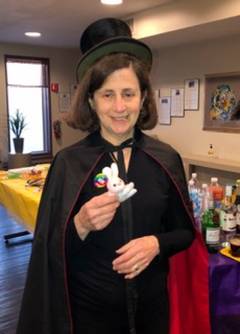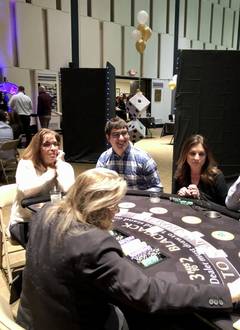Va-yera 5780: Laughter
11/19/2019 03:45:44 PM
| Author | |
| Date Added | |
| Automatically create summary | |
| Summary |
Va-yera 2019 This week, I had occasion to visit another synagogue in the New York area. It is nowhere near here, and I will not name it in order to protect the innocent. As I wandered around looking for my meeting, I saw a large sign near the door to their children's playground, saying: “No high heels on the playground surface,” accompanied by a graphic of an extremely high-heeled shoe with a red circle and diagonal line around it. I immediately sent the picture to a few relatives, who found it as hilarious as I did. I understand why they have this rule; the surface is probably made of some spongy material that could be punctured by a high heel. But the underlying assumption that someone might consider high heels appropriate footwear for watching children play struck me as hilarious, and perhaps revealing about the nature of this community. Laughter is our response to the unexpected. A good comedian establishes a scenario with some kind of tension in it, and then releases that tension with something unexpected, the punch line. We laugh when something peculiar or surprising happens, as a sign that the tension has been relieved. Or, we laugh as a way of dealing with discomfort, as a way to cover up feelings like pain or uncertainty or awkwardness. In this week's Torah portion, Va-yera, we encounter laughter. Three visitors announce to Abraham that within a year's time, he and his wife Sarah together will bear a child. While God had already promised this to Abraham, the exact timing is news to him. Sarah overhears the visitors tell Abraham this news and she laughs to herself in response. We might see Sarah's laughter as a lack of faith. The Torah itself seems to suggest this. God asks Abraham, “Why did Sarah laugh…is anything too wondrous for the Lord?” (Genesis 18:13-14). But we might understand Sarah's laughter as the natural response to her encounter with the seemingly impossible becoming possible. As the Torah reminds us in that moment in the story, Sarah and Abraham were rather elderly, and Sarah had long stopped menstruating. She had desperately wanted a child and seems to have given up on that possibility long ago. While Abraham was able to father a child with Sarah's servant Hagar, Sarah likely resigned herself to being childless long ago. So the notion that she would soon bear a child seemed ridiculous, laughable, to Sarah. Sarah is right to express some doubt, some skepticism, that she will actually become a mother. But there may be something else within Sarah's laughter: a laughter of joy at the possibility of finally having a child. As my colleague Rabbi Ariella Rosen put it this week, Sarah's laughter shows how Sarah is “processing the tension between the possibility of having her dreams come true, and the impossibility that her body would allow it to happen.” Her laughter, in other words, expresses both the joy at what may come and the doubt that a child could possibly be born to her. And then, the impossible happens. God remembers Sarah and she bears a child, naming him Isaac or Yitzhak, a name derived from the Hebrew root for laughter. A Midrash (Genesis Rabbah 53:9) suggests that the birth of Isaac was accompanied by many other miraculous events: other childless women also gave birth, people with chronic illnesses were healed, and even the sun and moon shone a little brighter. Sarah's laughter also created lots of reasons for others to laugh with her. But this time, Sarah's laughter is a joyous laughter, not an incredulous laughter. So, the story of the birth of Isaac is a journey between two types of laughter, between a laughter that finds absurdity in the impossible becoming possible, and a laughter that finds joy when was considered impossible actually occurs. Perhaps that is why we read this story on Rosh Hashanah: on the cusp of a new year, we remind ourselves that the realm of the possible is in fact much wider than we may have thought. We remind ourselves that what others say is impossible, laughable, might in fact, with God's help, become possible. In a sense, we as Jews have long been the people who have believed in the impossible. Our mere survival testifies that improbable things sometimes do happen. No matter how dire our circumstances may have been, we as Jews held fast to our belief, not because of the evidence but in spite of it, that a better reality is possible. That our actions matter and can make a difference. That the few can defeat the many. That our traditions and way of life are worth preserving. We have been laughed at throughout the centuries for this, been called naïve, retrograde, and idealistic. And yet we still believed in the impossible. In its own, mostly secular form, Zionism took up this Jewish belief in the impossible, in beating the odds. As David Ben-Gurion quipped, “The difficult we do immediately. The impossible takes a little longer.” In its own chutzpadik Jewish way, the Zionist movement seized on the seemingly-impossible idea of reestablishing a Jewish home in the land of Israel and made it happen in just a few decades. The secular Zionist poet Shaul Tchernichovsky expresses his optimism in his poem Sach'ki, Sach'ki, “Laugh, Laugh,” using a related root for laughter to the one that appears in Isaac's name. Tchernichovsky dares his listener to laugh at his dreams and his optimistic belief in humanity. His faith is not in a redeeming God, but in the strength of the human spirit to create a new and better reality, and the strength of the Jewish people to liberate itself. He acknowledges people may laugh at him, and yet he believes. If we are honest with ourselves, there are things we each believe or hope for that others may find laughable. Finding the strength to keep believing when life gets us down is the challenge of true faith. Yet, as this week's Torah portion reminds us, “Is anything too wondrous for God?” Given all of the impossible things that have in fact happened, from the birth of Isaac, to the birth of the State of Israel, and many other things besides, perhaps it is pessimism, not optimism, that merits laughter. May the rest we find this Shabbat open us to all of life's laughable impossibilities.
Tue, October 28 2025
6 Cheshvan 5786
Photo Gallery
Photo Albums
Upcoming Events
-
Thursday ,
OctOctober 30 , 2025Coffee with the Rabbi
Thursday, Oct 30th 8:00a to 9:00a
Start your morning with some caffeine and casual or meaningful conversation! Join Rabbi Goldberg for a Coffee Chat! Stop by Rye Ridge Starbucks any of the following Thursdays, between 8-9am: June 12 and 26 July 10 and 24 August 7 and 21 September 4 and 18 October 16 and 30 November 6 and 20 December 4 and 18 -
Saturday ,
NovNovember 1 , 2025Dror Israel Shabbat
Shabbat, Nov 1st 11:30a
Dror Israel Shabbat Dror Israel’s Mirit Sulema, along with two leaders of the Arab Youth Movement NOAL, Tal Tunik and Shadi Habiballa, will speak during a Kiddush lunch about their important work with Arab Israeli youth and bringing Jewish, Arab, and Druze youth together. Saturday, November 1st, approx. 11:30am KTI Social Hall "We eat together, laugh together. We talk about what we think of each other, and what will help bring peace.” RSVP Appreciated -
Saturday ,
NovNovember 1 , 2025KTI Gala - A November to Remember Digital Journal
Motzei Shabbat, Nov 1st 7:00p to 10:00p
-
Saturday ,
NovNovember 1 , 2025KTI Gala - A November to Remember
Motzei Shabbat, Nov 1st 7:00p to 10:00p
Saturday, November 1, 2025, 7:00 PM - 10:00 PM Harrison Meadows -
Wednesday ,
NovNovember 5 , 2025Rabbi, May I? Modern Responsa
Wednesday, Nov 5th 10:00a to 11:30a
Wednesdays, 10 - 11:30 AM, KTI Library Ever since Abraham’s famous argument with God, Judaism has been full of debate. Moses and Korah, David and Nathan, Hillel and Shammai, the Vilna Gaon and the Ba’al Shem Tov, Spinoza and the Amsterdam Rabbis . . . the list goes on. No wonder that Judaism cherishes the expression machloket l’shem shamayim, “an argument for the sake of heaven.” Beyond their historical importance, what makes these disputations so compelling is that nearly all of them, regardless of their epochs, are still being argued. The parade of characters spanning three millennia of biblical, rabbinic, and modern disputation reflects the panorama of Jewish history with its monumental political, ethical, and spiritual challenges. This series will examine Jewish responses to exile from the biblical period to our modern day. Considering texts from all genres of Jewish literary creativity, we will explore how the realities and iterpretaions Join as we re-open these timeless debates that lead us to the core of 3,000 years of Jewish conversation. • Justice: Abraham vs. God (October 19) • Holiness and Authority: Moses vs. Korah (November 9) • Inclusion: The Five Daughters vs. the Twelve Tribes (November 30) • Accountability and Morality: David vs. Nathan (December 21) • Resistance: Ben Zakkai vs. the Zealots (January 18) • Law: Hillel vs. Shammai (February 15) • Spirituality: The Vilna Gaon vs. the Baal Shem Tov (March 15) • Boundaries: Spinoza vs. the Amsterdam Rabbis (April 19) • Religious Evolution: Geiger vs. Hirsch vs. Frankel (May 10) • Zionism: Herzl vs. Wise (May 31)
Privacy Settings | Privacy Policy | Member Terms
©2025 All rights reserved. Find out more about ShulCloud






